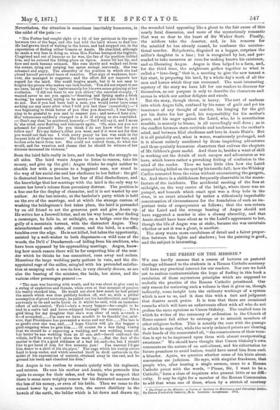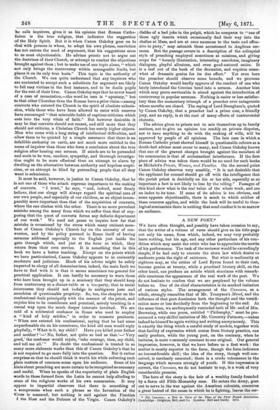THE PRIEST ON THE MISSION.*
WE can hardly assume that a course of lectures on pastoral. theology addressed to the students in a Roman Catholic seminary will have any practical interest for our readers. Nor can we hold. out to zealous controversialists the hope of finding in this book a revelation of those mysterious principles which are supposed to underlie the practice of the Roman Catholic priesthood. Our only reason for reviewing such a volume is that it gives us, though. indirectly, some insight into the ordinary workings of a system which is new to us, and it does this with a tact and judgment. that deserve much praise. It is true that there are occasioual remarks which will have an unfortunate effect with all who do not profess the same opinions as Canon Oakeley. The exalted tone in which he writes of the ceremony of ordination in the Church of Rome cannot fail either to estrange or to astonish members of other religious bodies. This is notably the case with the passage in which he says that, while the newly ordained priests arc clearing their hands of the consecrated oil, "the consciousness of their voca- tion is apt to be impressed upon them with almost overpowering. sweetness." We should have thought that Canon Oakeley's owi. comments on the nature of an anti-climax, and his exhortation to future preachers to avoid bathos, would have saved him from such a blunder. Again, we question whether some of his hints about conversion are judicious. He says, with singular frankness, that. people who, after hearing a single sermon, come to a Roman. Catholic priest with the words, "Please, Sir, I want to be a. Catholic," form a class of inquirers who present little or no diffi- culty. It may be right for a member of the Roman Communion. to add that when one of these, whom by a stretch of courtesy
• The Priest on the Mission; a Course of Lectures on Missionary and Parochial Da. By Canon Frederick Oakolcy, M.A.. London: Longman& 1137L
he calls inquirers, gives it as his opinion that Roman Catho- licism is the true religion, that indicates the suggestion -of the Holy Spirit. But it is when Canon Oakeley goes on to -deal with persons in whom, to adopt his own phrase, conviction has not outrun the need of argument, that his suggestions seem -to us most objectionable. He advises priests not to argue out the doctrines of their Church, or attempt to combat the objections "brought against them ; but to make use of one topic alone, "which .not only brings the controversy within manageable limits, but ,places it on its only true basis." This topic is the authority of the Church. We can quite understand that any inquirers who are contented to accept such a substitute for argument are likely to fall easy victims in the first instance, and to be docile pupils -for the rest of their lives. Canon Oakeley says that he never heard of a case of recantation,--the word he uses is " apostacy," but to that other Churches than the Roman have a prior claim—among -converts who entered the Church in the spirit of absolute submis- sion, while those who have been allowed to enter with reserves have encouraged "that miserable habit of captious criticism which .eats into the very vitals of faith." But however desirable it may be that converts should not recant, and still more that they should not criticize, a Christian Church has surely higher objects. Men who come with a long string of intellectual difficulties, and allow them to be quieted by a simple assurance that there is an infallible authority on earth, are not much more entitled to the _name of inquirer than those who form a conclusion about the true religion after hearing one sermon. If minds are to be persuaded and souls to be won, candour, sympathy, and thorough investiga- tion ought to be more effectual than an attempt to alarm by -dwelling on the alternative between authority and hopeless scepti- .cism, or an attempt to blind by persuading people that all they want is submission.
It must be said, however, in justice to Canon Oakeley, that he is not one of those who attach supreme importance to the making of converts. "I trust," he says, " and, indeed, most firmly believe, that our clergy will always regard the spiritual care of our own people, and especially of our children, as an object incom- parably more important than that of the acquisition of converts, where the one clashes with the other. There is no more prevalent mistake among the many from which we suffer than that of sup- posing that the quest of converts forms any definite department of our work." We need not pause to inquire how far that mistake is occasioned by the stress which many eminent mem- bers of Canon Oakeley's Church lay on the necessity of con- version, and by the policy pursued in Rome itself of having sermons addressed especially to the English just inside the gate through which, and just at the hour at which, they return from their own service. It is something that in this book we have a better teaching. Eicept on the points which we have particularized, Canon Oakeley appears to us eminently moderate and judicious. Much of his advice might be safely imparted to clergy of all denominations, indeed, the main fault we have to find with it is that it seems sometimes too general for practical application. It can hardly be necessary to warn those who have been brought up in a seminary that they should keep from controversy at a dinner-table or a tea-party, that in social intercourse they should not indulge in ambiguous jests and anecdotes of questionable propriety. So, too, the chapter on the confessional deals principally with the manner of the priest, and enjoins him to be considerate and punctual, merely touching in a -casual way upon the much deeper interests involved. We are told of a celebrated confessor in Rome who used to employ a "kind of holy artifice," in order to reassure penitents. "When one entered his confessional, saying that he had some unpardonable sin on his conscience, the kind old man would reply playfully, "What is it, my child ? Have you killed your father and mother? '—' No, father, not quite so bad as that.'—' Very good,' the confessor would rejoin, 'take courage, then, my child, and tell me all.'" No doubt the confessional is treated in so many more elaborate works than this of Canon Oakeley's that he
is not required to go more fully into the question. But it rather _surprises us that he should think it worth his while enforcing such plain matters of common-sense upon his audience. Some of his hints about preaching are more certain to be recognized as necessary and useful. When he speaks of the superiority of plain English words to those formed from the Latin he cannot help alluding to -some of the religious works of his own communion. It may appear to impartial observers that there is something of a compromise when such a phrase as the Invention of the Cross is censured, but nothing is said against the Fraction
the Host and the Dolours of the Virgin. Canon Oake]ey's dislike of a bad joke in the pulpit, which he compares to "one of those ugly insects which occasionally find their way into the chalice at Mass, and are at once nauseous to the taste and offen- sive to piety," may astonish those accustomed to Anglican ser- mons. But the passage occurs in a description of the colloquial style of preaching employed sometimes at missions, and giving scope for "homely illustration, interesting anecdotes, imaginary dialogues, playful allusions, and even good-natured satire. It is a leaf out of the book of the dramatist, and requires some- what of dramatic genius for its due effect." Yet even here the preacher should observe some bounds, and we presume Canon Oakeley would hardly approve of the conduct of one who lately introduced the Grecian bend into a sermon. Another hint which may prove serviceable is aimed against the introduction of controversy in popular sermons. Nothing is easier or less satisfac- tory than the momentary triumph of a preacher over antagonists whose mouths are closed. The saying of Lord Brougham's, quoted by Canon Oakeley, that a preacher had a prime case, a friendly jury, and no reply, is at the root of many efforts of controversial rhetoric.
The advice given to priests not to mix themselves up in family matters, not to give an opinion too readily on private disputes, not to have anything to do with the, making of wills, will be approved by people of all opinions. The late case in which a Roman Catholic priest showed himself in questionable colours as a death-bed adviser must occur to many, and Canon Oakeley knows that one of the gravest charges brought against the members of his communion is that of ecclesiastical interference. If the first piece of advice was taken there would be no need for such books as Michelet's Priests, Women, and Families. On the second point Canon Oakeley observes very sensibly, "it is not desirable that the applicant for counsel should go off with the intelligence that the parish priest is decidedly on his or her side, especially as so important a fact is not likely to lose by the telling." Passages of this kind show what is the real value of the whole work, and are an index to its tone. If some of its advice is too obvious, and some appears objectionable, there is much to which neither of these censures applies, and while the book will be useful to theo- logical seminarists there is nothing that need confine it to so narrow an audience.

































 Previous page
Previous page